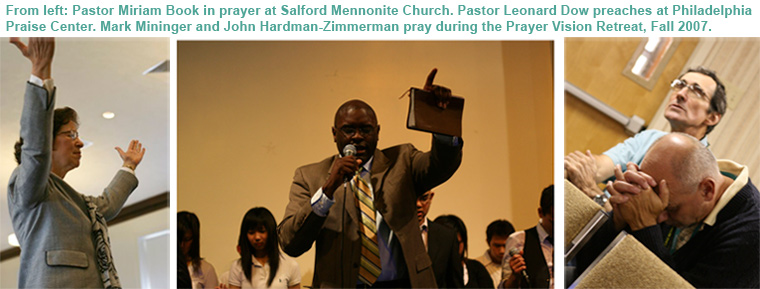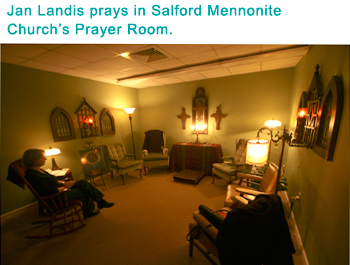
Randy Heacock, randy.heacock@doylestownmc.org
Pastor, Doylestown Mennonite Church
When visiting an out of state relative, I would frequently be asked, “Do you want to go for a ride?” I soon discovered that while the destination of this ride was to get something, the purpose was to spend time together. I learned to look forward to saying yes to this opportunity. This is a bit how I feel about the prayer ministry at Doylestown Mennonite Church. Though the forms and environment may vary, the purpose to spend time in God’s presence, is always a blessing. For this reason, I find it easy to be supportive of and to say “yes” to the unfolding nature of our prayer ministry.
Like running errands with my relative, I have simply been along for the ride. The joy of our prayer ministry is that I take no credit for its vision or focus. Rather it has been my blessing to hear and see this vision take shape in and transform others. It began several years ago when I was released through a teaching by Noel Santiago to free up those called to pray. Therefore, my role has simply been to encourage, help navigate the administrative structures of the church, to learn and to be transformed. As I said to someone recently, prayer is not the only thing we can do, but the best.
It is these later experiences that have been most surprising and enjoyable in my journey. Being treated to articles, seminars and a greater variety of prayer experiences has nurtured and energized me significantly. The constant awareness that intercessors are praying during our entire worship service and hearing God’s words of affirmation, encouragement and challenge through others has been a tremendous blessing. Monday morning phone calls from members who are praying for me that week ground me in whose work it really is and what agenda to pursue.
On a personal level, my experience of worship has increased significantly. My ability to be engaged in worship on a regular basis has multiplied my joy in preaching. It has been challenging as well. I have been humbled to admit my need for confession, struggles that continue to entangle me and stressful relationships. There have also been some risks in trying new things prompted by prayer. One such area that I am still learning about is listening to God when awakened at 3 or 4 AM. Prayer has also laid a foundation on which to unite with other Christians in seeking God together.
In my years of ministry being supportive of the prayer ministry at Doylestown Mennonite Church is easily the wisest and most productive choice possible. The sense of God’s presence both individually and corporately has become more evident. People’s lives have been transformed both in being prayed for and in praying. Sometimes in our practical approach to life, we feel the need to fix broken relationships, financial struggles and crisis. Prayer both provides a resource of hope for the individual and can guide our actions in more meaningful ways than we first think.
I will close by listing a few practical suggestions by which a pastor can support a prayer ministry in any congregation.
* Discover who God is calling to this ministry.
* Encourage and equip them with the financial and the
facility space needed.
* Demonstrate a personal commitment to the prayer
ministry as a high priority.
* Be willing to learn and be led by those leading the
prayer ministry.
* Welcome the prayers of concern and prayers of
blessing on your behalf.
I encourage you to go along for the ride as you support the prayer ministry God desires for your congregation. God will truly bless every time you say “yes” and invest time, space and financial resources to this ministry.



 In my encounter with the contemplative tradition and more recently, by attending Franconia Conference prayer intercessors meetings and hosting an Alpha course at our church (see
In my encounter with the contemplative tradition and more recently, by attending Franconia Conference prayer intercessors meetings and hosting an Alpha course at our church (see 



